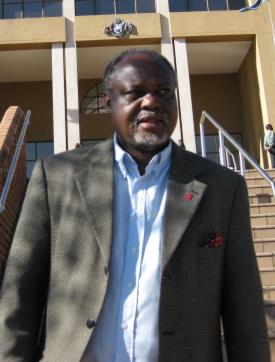|
Swaziland Politics Still no intl pressure on Swaziland
Swaziland is not an issue or concern in most countries around the world. This can be seen by the fact that most foreign ministries do not have details on Swaziland on their websites - somewhat symptomatic of the international community's lack of interest in regard to the country's repeated human rights violations, poverty and lack of democracy.
And Swaziland's biggest trading partner, South Africa - representing over 90 percent of Swaziland's imports and 60 percent of its exports - seems to be intent on the same "quite diplomacy" that has helped keep President Robert Mugabe in power in Zimbabwe. In September 2010, the South African Cooperation Minister, Maite Nkoana-Mashabane, said "as regards Swaziland, South Africa follows a policy of good neighbourliness towards the country." There are signs, however, that parts of South Africa's ruling ANC are becoming increasingly willing to criticise Swaziland's regime more openly. The ruling party has resolved to have a "full discussion" on the situation in Swaziland, and a trade union-led campaign to condemn and isolate the Swazi regime is now getting wider support, including from the ANC. As for the countries that do not have a significant historical, economic or political stake in Swaziland, the tendency is pretty much the same; reaffirming of friendship tempered with mild criticism, although there are few examples of countries that offer some criticism of Swaziland. Norwegian Ambassador to Swaziland, Tor Christian Hildan, in August 2010 spoke of the two countries always having "been on very friendly terms," but also of the "growing concern that we observe the difficult situation regarding human rights and freedom of expression." The Canadian Ministry of Foreign Affairs says that it "believes that it is important that the Government of Swaziland work to strengthen the rule of law and to establish a constitutional environment that respects human rights and fosters democratic development, in addition to addressing the serious challenges of poverty and disease it is currently facing." And the Austrian Foreign Ministry mentions how its relations with Swaziland "have been friendly ever since [independence]," but also mentions "the human rights deficits in Swaziland." Most other countries are less critical or non-committal, however. The Danish Foreign Ministry conceded in a meeting with the civil society group Africa Contact in July 2010, that Swaziland was "not a high priority for the Danish Foreign Ministry" and that any actions related to Swaziland were to be handled at EU-level, although the Danish Embassy, also in a meeting with Africa Contact in September 2010, said that they didn't believe that the EU or Denmark criticising the Swazi regime would make any difference. The Japanese Ambassador in 2009 spoke of the relationship between Japan and Swaziland as being "excellent." The German Foreign Office of their relations with Swaziland being "traditionally good and friendly." The French Ministry of Foreign Affairs says that "political relations are good but modest." And the Ministry of Foreign Affairs of Indonesia speaks of its relationship with Swaziland being "well established due to the similar perspectives of both parties in several sub-regional, regional and international forums." The rest merely warn their citizens against the dangers of visiting impoverished, undemocratic nations such as Swaziland, but do not outline any policy for Swaziland or criticise its human rights record. The Australian Department of Foreign Affairs, for instance, merely advises its citizens to "avoid large public gatherings and street demonstrations as they may turn violent." And the Swiss Department of Foreign Affairs only mentions the "tensions between the king / government and opposition groups" and that these "can lead to violence," but not the cause of the tensions. By Peter Kenworthy, Africa Contact © afrol News - Create an e-mail alert for Swaziland news - Create an e-mail alert for Politics news
On the Afrol News front page now
|
front page
| news
| countries
| archive
| currencies
| news alerts login
| about afrol News
| contact
| advertise
| español
©
afrol News.
Reproducing or buying afrol News' articles.
You can contact us at mail@afrol.com









